#VolkswagenGroup
Volkswagen Explains Its Complicated Relationship With Electricity and Fuel
Like most legacy automakers, Volkswagen is casually walking back promises of electrification. As with self-driving cars, the technology behind new-energy vehicles is taking longer to mature than the industry would like. Meanwhile, the market — skewed as it is toward larger models — has been about as cooperative as a sugared-up child come bedtime.
Despite governments around the world incentivizing the sale of EVs, they’re still but a fraction of whole.
With the pandemic undoubtedly discouraging consumers from purchasing big-ticket items, electric vehicle sales aren’t presumed to make a lot of headway in 2020, either. We recently learned that some of the promises made by Ford and General Motors in regard to electrification were overblown by corporate messaging. In truth, they both plan on remaining heavily dependent upon truck and crossover sales for several more years.
However, Volkswagen seemed to be betting everything it had on battery technology. In the wake of its 2015 diesel emission scandal, VW was one of the first companies to promise widespread electrification by suggesting it would build one million EVs by 2023 — with 70 new green models introduced by 2029. The past year has seen the automaker issue qualifying remarks that leave us feeling dubious about its end goal.
Volkswagen Group Planning to Stall European Production, Same for Toyota
With reports of factory shutdowns now being the norm, Volkswagen and Toyota have predictably decided to idle facilities in Europe to mitigate the negative influence of the novel coronavirus. VW Group had already made plans to temporarily close assembly lines in Italy, Portugal, Slovakia and Spain. But said that the entirety of Europe will probably be affected this month.
Toyota was singing a similar song on Tuesday morning, saying it would suspend production in France and Portugal this week. Considering the sameness of these virus-related cancelations, we’ll not bore you with any recaps — you know how we got here. Instead, here’s the gist of the manufacturers’ respective strategies:
Volkswagen's Making Big Promises About Electric Vehicles and the Energy Grid
Volkswagen Group’s transition toward electric vehicles has been no secret. Since getting busted with software designed to defeat emissions testing five years ago, the manufacturer has trumpeted the merits of electrification at every opportunity. Still, some continue to wonder how an EV-dominant world will work, expressing concerns that peak charging hours could stress national energy grids past the breaking point.
One proposed solution is to use the connectivity available in modern cars to take power from the grid only when surplus energy is available, while feeding electricity back into it during peak draw hours. Michael Jost, VW’s head of product strategy, said this was something the automaker has been working on.
Volkswagen Diesel Lawsuit Ends in German Settlement
German consumer group VZBV has reached an agreement in its class-action lawsuit against Volkswagen over the use of illegal software intended to cheat emissions testing. The settlement amounts to 830 million euros (roughly $912 million USD). While not nearly as sizable as what U.S. customers received in their settlement, it’s what VW believes its European customers deserved. Citing a breakdown in negotiations with VZBV earlier this year, the automaker said it was willing to offer €830 million and wasn’t interested in shelling out any extra for litigation attorneys who allegedly wanted €50 million for handling the case.
The manufacturer seems to have gotten its way, though we doubt VW considers shelling out another billion to handle a five-year-old scandal a major victory.
Pre-release Party: Volkswagen Debuts Mk8 GTI Ahead of Geneva
Volkswagen gave the 2021 Golf GTI some uninterrupted time in the spotlight by debuting it ahead of the Geneva International Motor Show. While VW kept plenty of details under wraps, the important items were on display. Pay close attention, as this may be one of the few Golf models we receive in the United States and Canada.
Around these parts, the take rate for VW’s performance hatchbacks (GTI and Golf R) is far greater than that of the economy model, and it seems the manufacturer finally took notice. The manufacturer has yet to confirm anything at this point, but all signs point to GTI becoming the base trim inside the U.S.
In Euro-spec form, that means 245 horsepower and 273 pound-feet coming out of a predictable 2.0-liter turbo. That’s a sizable bump over last year’s 228 hp and 258 lb-ft and, assuming the GTI hasn’t packed on the pounds for the 2021 model year, it should yield noticeable performance gains.
Report: Audi E-Tron Production Stalled Over Suspected Battery Shortage
Audi has reportedly paused assembly of its all-electric e-Tron to address production issues that include battery supply bottlenecks. It’s not uncharted territory for the model. Audi had to delay the model’s launch over claimed software changes in 2018, though it was known that corporate parent Volkswagen Group was having trouble with battery supplier LG Chem at the time. Since then, the crossover’s short life has been a well-publicized series of victories and failures.
Outselling rivals like the Jaguar I-Pace by a margin of almost two to one, Audi delivered 5,369 e-Trons in the United States in 2019 despite it not being available for the full year. Competition was closer in Europe, with the Audi still moving in larger volumes. The model also received favorable crash test ratings and was awarded with the IIHS’ Top Safety Pick+ designation.
However, supply problems never really abated. Every few months brought a new rumor that Audi was suffering from battery shortages, possibly forcing it to idle production. A battery fire scare prompted the factory to voluntarily recall the first batch. While the impact of these issues was rarely as serious as feared, their persistent nature caused many to wonder how ready the industry actually is for the transition to EVs.
Nobody Panic: Porsche Taycan Fire Confirmed by Automaker, Cause Unknown
While car fires may not be commonplace, they still happen. Your author saw a Buick Century burning itself into nothing along the West Side Highway not more than three months ago. Local media referenced it as the probable cause for midday delays, but it would have earned its own story had it been a rarer model.
Exotics and electrics garner headlines when they do their best impression of kindling; regular cars only get attention when they’re catching fire en masse. In addition to the warm feeling one gets when learning a car they can’t afford has destroyed itself, there are loads of people who are curious about the dependability of burgeoning technologies. Hypercars are often on the bleeding edge of available tech and are assembled in low volumes. As a result, eyebrows are raised anytime one goes up in smoke for no apparent reason.
Electrics vehicles are in a similar situation. Reportedly poised to take over the world someday, they’ve yet to saturate the market and still stand out wherever they’re parked. Battery fires, which offer the departments tasked with fighting them new challenges, have also become a point of interest after a batch of EVs in Asia turned up the heat.
Volkswagen Offers $900 Million to German Diesel Owners, Says Lawyers Are Greedy
Volkswagen has had to spend mountains of money since being caught using illegal software to hide excessive diesel pollution during regulatory testing five years ago. As if millions of vehicle buybacks and repairs weren’t costly enough, VW also had to contend with billions of dollars in regulatory fines and countless consumer lawsuits — and the hits keep on coming.
While the United States enacted swift justice upon VW, Europe has been slower to take action. That, in addition to EU laws making it much more difficult for class-action suits to get off the ground, meant Europeans received nothing as VW’s American customers saw checks cut to the tune of $20,000 apiece. Germany has only allowed class-action lawsuits since 2018, providing an opportunity for Volkswagen to continue playing legal hardball. But it’s been backpedaling all across Europe.
Citing a breakdown in negotiations with German consumer association VZBV, which was attempting to reach a settlement deal for German customers attached to its class-action suit, the automaker said Friday it is willing to offer €830 million (about $899 million).
German Automakers Look to South America for Keystone Lithium Supply
With Europe increasingly fixated on regulating vehicular emissions, German automakers are throwing themselves into electrification like ’90s moms did with Beanie Babies. As with those moms, the investment has yet to pay off. Still, that hasn’t encouraged anyone to change course. Every player understood from the outset that transitioning to EVs was bound to be costly and, with increasingly stringent regulations proposed every month, there aren’t many alternatives.
Volkswagen placed its very existence on electrification after Dieselgate, quickly running into problems with battery suppliers. And while VW claims it’s solved the issue for the next few years, it isn’t out of the woods yet. VW and Daimler have reportedly commissioned a study into sustainable lithium mining in Chile, but it’s already receiving pushback from environmental groups concerned about the delicate nature of the region’s Atacama salt flat — where the metal is found in abundance.
Report: Audi Wants to Ditch Interior Buttons, Free up More Screen Space
With Cadillac torpedoing any hope we had that the touchscreen trend might come to swift end, we started digging around to see the latest and greatest interior screen experiences automakers are hoping to push onto the market. The worst offenders cropped up in concept vehicles, though most automakers aspire to equip future models with more screen space than you’ll know what do with — see China’s Byton for an example.
As for less speculative specimens, Audi had us covered. The brand’s MMI Touch Response infotainment system sacrifices physical controls for three rather large interactive displays. Limited to higher-end models (A6, A7, A8, and Q8), MMI groups a 12.3-inch digital gauge cluster, 10.3-inch central console, and a smaller 8.6-inch display for controlling the HVAC system. Apparently, that’s the interior Audi wants to run with for all future vehicles while it works up something new.
Good Omen: Porsche Is Plenty Pleased With Taycan Reservations
Porsche has taken payments from 30,000 European customers eager to be among the first to drive the brand’s first all-electric vehicle, the Taycan sedan. The number of reservations exceeded the automaker’s expectations, according to CEO Oliver Blume.
It also gives some amount of hope that electric vehicles still have a place in the premium market space. EV sales remain weak and high-end models like Jaguar’s E-Pace and Audi’s e-tron have struggled, though both have suffered supply-related struggles since entering production.
Volkswagen Charged With Violating Vehicle Emission Rules in Canada
Volkswagen Group can’t seem to escape the rippling effects of its 2015 emissions cheating scandal. It wasn’t long ago that the automaker was subjected to surprise raids from German prosecutors, still investigating its regulatory malfeasance. On Monday, Canada threw its hat into the ring — charging the company with importing roughly 128,000 vehicles into the country in direct violation of its environmental laws.
Environment and Climate Change Canada (ECCC) announced VW is facing 60 counts of breaching the Canadian Environmental Protection Act by selling automobiles that fell outside the prescribed emission standards. Broken down, that includes 58 counts of contravening the law between 2008 and 2015 with two counts of providing misleading information.
Volkswagen Boosts Tech Spending to $66 Billion Over Five Years
Volkswagen Group has decided to increase spending on the development of electric and digital technologies over the next five years to 60 billion euros ($66 billion USD). The automaker estimated the revised strategy amounts to slightly more than 40 percent of its investments in property, plant and equipment, and all research and development costs during the planning period.
Of that sum, 33 billion euros are expected to go directly toward the development of new electric vehicles. The increase allocates roughly €12 billion annually for hybridization, electric mobility and digitalization. The old plan set aside 8.8 billion euros per year.
Debatably Affordable Porsche Taycan 4S Launches Next Spring
While Porsche’s Taycan has been praised as unquestionably worthy of the Porsche name, it’s also subject to the brand’s (ahem) aggressive pricing structure. Gone are the days when you can purchase a basement-level Porsche 944 for the modern equivalent of $20,000. The cheapest model currently occupying the automaker’s portfolio is the 718, which sets you back 57 grand before you’ve added a single option.
When the Taycan debuted as Porsche’s first purely electric vehicle a number of weeks back, the model’s $150,900 (before destination) MSRP was expected. Porsche rolled out the higher-end “Turbo” trims first, with promises of more budget-minded models to follow. That car arrived today, and it costs $105,150.
Volkswagen Unveils Updated R Logo
Volkswagen has revealed an updated R logo that it says will still symbolize performance while also representing the brand’s “fresh start” — its refocus on electric vehicles, rather than the diesel ones that got it into trouble back in 2015.
VW similarly rejiggered is brand’s main logo, eliminating its three-dimensional aspects for a streamlined version highly reminiscent of the symbol used through the 1970s, debuting the new (old?) design at this year’s Frankfurt Motor Show. But the R’s transformation has resulted in something entirely novel, abandoning the leftmost vertical line in favor of an abstracted representation of the letter.
However, tweaking the visuals of a single character doesn’t have much meaning in itself. All we really care about is whether or not the R badge will still denote the maximum performance available from various VW models.





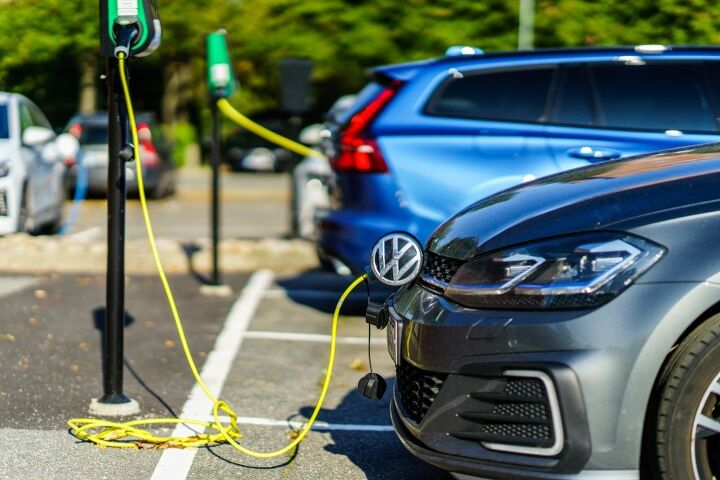

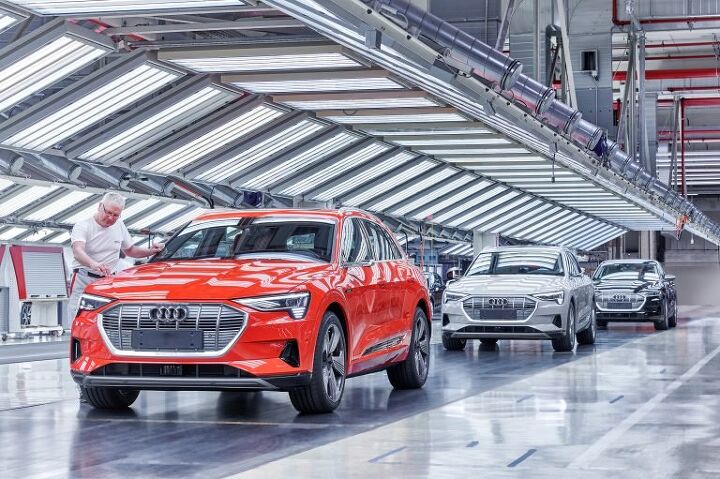


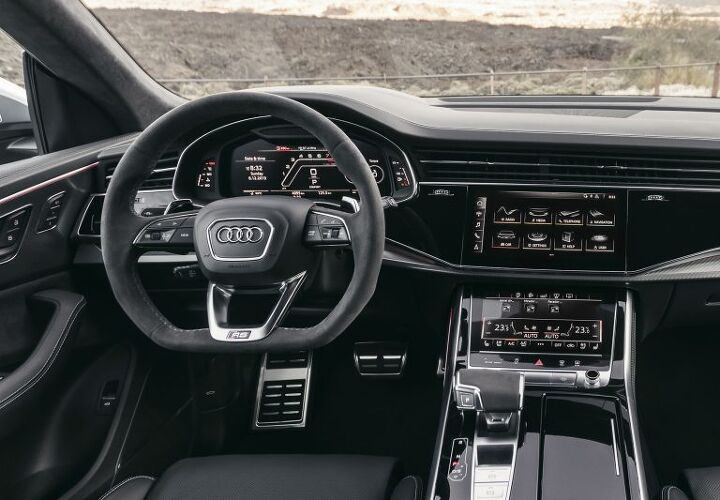



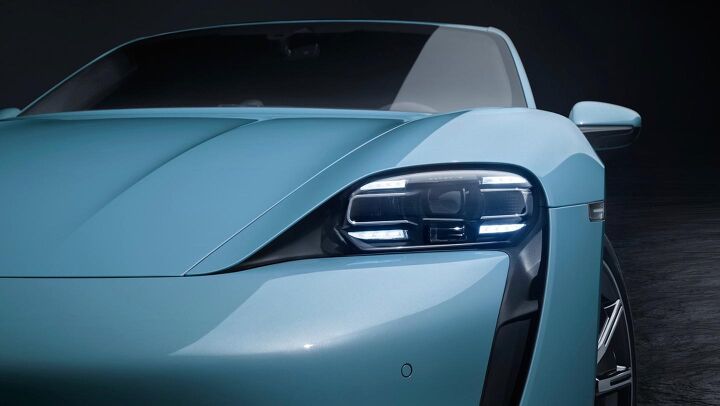
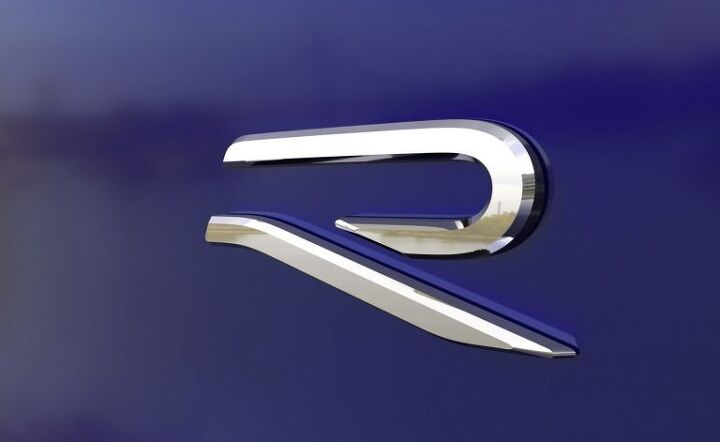












Recent Comments